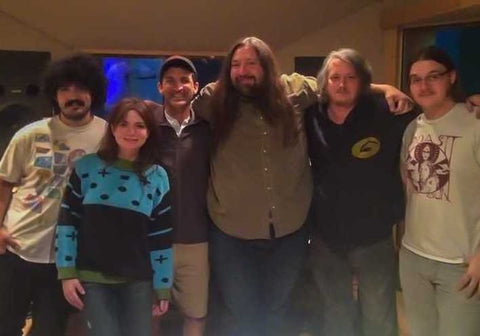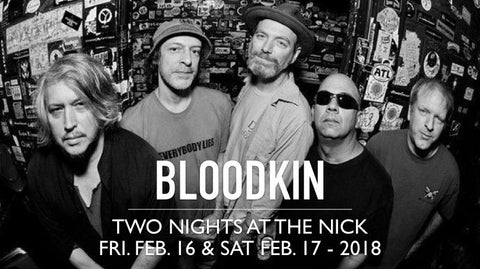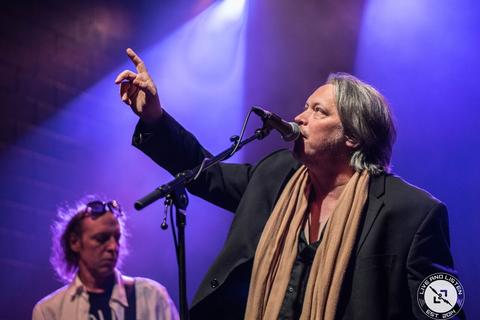The Ghost of Mr. Johnny Cash Dumped Out My Cocaine: The Story Behind the Song January 8, 2018 15:34

Erika Rasmussen: Danny and I share many mutual friends and came to know each other as an Athens certainty. We’ve gone back and forth for a while on ways to combine our love of writing in a collaborative project. We cooked up the idea of a series of writings, each featuring a different song and a different musician. When I got a chance to work on this project, of all the songs in Danny's amazing library, this was the first song I jumped on. And I’m so glad to know the backstory and appreciate the song even more now. No story of the South is complete without some of our seniors appearing as old growth trees in this ever-changing landscape. And getting the input of my beloved Dave Schools about this amazing song? Well, that’s the ice cube in my drink.
Sometimes the opening line to a song makes you do a double take and take stock of the band all over again. Try this one on for size: “The ghost of Mr. Johnny Cash dumped out my cocaine, At least my Mama told me he did…” I was enjoying another raucous night in the Classic City, watching Bloodkin do what they do best. This was at their annual “Bloodkin & Friends” show, this year burning down the house at The 40 Watt Club. I thought I knew Bloodkin's songs and their style by this point. I wasn't the only one who did a double take at the opening line of this song, either. It’s an attention-grabber. This song has a different twang to me that is irresistible. It doesn’t hurt that Danny sprinkled some of my musical heroes throughout the song’s lyrics. “Waylon Jennings says I’ll go to hell, if I don’t change my evil ways…Waylon Jennings ought to know mighty well.” I may lean towards this song because “American Country Ghosts” has the driving heartbreak sound of some of my favorite bittersweet ballads. Danny's poetic imagery and authentic Southern angst are reminiscent of a Patterson Hood rant or a Sarah Shook tale of woe. This is the kind of song that you find yourself walking around singing and, more importantly, contemplating, for days afterward.
So pull up a chair. Pour a finger (or two) of whiskey. And sit back for the story behind the song.

Click here to stream/purchase Daniel Hutchens' album, The Beautiful Vicious Cycle of Life. Catch Bloodkin in Birmingham at The Nick after both nights of Widespread Panic at the BJCC in February!
Daniel Hutchens: Toward the end of her life, my mother, Frankie Irene, developed dementia and was no longer able to live on her own. In previous years she seemed to anticipate what was coming, and was fearful about the idea of being placed in a “nursing home.” (Modern and politically correct terminology is “assisted living”, “senior living”, etc., but Mom called these places “nursing homes.”) Mom and I had a deep bond, always emotionally close, though we disagreed about plenty and could certainly do our share of bickering. I think I inherited some of her pure Appalachian stubborn. But anyway, some years back, she and I came to an agreement: she told me, “Danny, when the time comes, I want to live with you. Keep me out of those places as long as you can.”
So I did. Mom moved down from West Virginia to live with me in Athens, Georgia in 2011, and stayed with me for 3 ½ years. Until finally my siblings and a small army of doctors convinced me her condition had deteriorated to the point where I couldn’t provide the kind of 24 hour care she needed. That was a judgment call I just couldn’t bring myself to make, and Mom fiercely protested the idea too, when I’d try to.
Mom developed “sundowning” (a condition where moods are extreme and strongly influenced by changing light), and some days she would alternate between bleak depression and fits of rage. And her overall condition intensified; eventually she had zero short term memory, would eat a meal then stand up from the table and ask when we were going to eat, etc. She was also delusional and often asked when we were going to be leaving on some imagined journey, or insistently tried to find a person who had been dead many years. She sometimes woke me by leaning over my bed and asking where one of her long-dead husbands had wandered off to, saying, “I was just talking to him a few minutes ago.” It was a chilling jolt, waking up that way.
But during that sorrowful chaos of Mom’s last year in my house, I really didn’t get much sleep anyway. I stayed up with her all hours, trying to calm her fears. She was often worried and downright scared of something nameless, and wouldn’t drift off to sleep til sunrise. So I sat there in her room and talked with her through many a long night.
Songwriting has always been, among many other things, my form of therapy. And some pretty dark songs worked their way out of me during those distressing days, watching Mom’s decline. One day she walked into the living room in tears and told me, “Danny, I can’t find myself!” That phrase shook me, and I wound up writing a song with Todd Nance called “Can’t Find Myself” (still unreleased).

Another time, I was asleep and dreamt a cinematic version of what later became “American Country Ghosts.” I saw the story in that dream first, and it played out like I was watching a spooky old movie: a dream version of Mom’s old house in West Virginia, and I was living there with her again, but she was still lost in her dementia and slowly dying. And she was relaying messages to me which she said she’d received from the ghosts of great Country Music stars passed: Johnny Cash, Hank Williams, Patsy Cline, and Waylon Jennings. It was a rotten, sad dream emotionally, but the imagery was so strong I had to write it down as soon as I woke up.
At the same time Mom was struggling, my marriage was fraying, finally leading to a divorce. These events plus the deaths of some dear friends took their toll on me, and I think contributed to some physical ailments. I finally had a minor stroke in 2016, but a few years before that I wound up in an emergency room in San Francisco due to extreme high blood pressure, which ended a Bloodkin acoustic tour of the West Coast. I flew back to Athens to recuperate, and that’s when Dave Schools came to town.
Dave was camped out in John Keane’s studio, mixing the first Hard Working Americans album, and he had invited me to drop by. So one afternoon I meandered over to say hello, and sat with Dave and John awhile and listened to a few mixes. Which were sounding great, and prompted my offhand remark, “Man, this makes me want to make another record.” To which Dave replied, “Well…let’s make one.”
It was that simple. That’s what started the ball rolling for what became my third solo album, The Beautiful Vicious Cycle of Life. I already had a good crop of songs ready to go, which were my stories and confessions about the rough patch I was living through. A few of the songs directly referenced the situation with Mom, including the title song, and most specifically, “American Country Ghosts”.

It was a country song, probably alt-country would be the working category, and I already heard it pretty full-formed in my mind before we began recording over at David Barbe’s Chase Park Transduction studios. Dave Schools produced, Barbe engineered, and we found some great musicians to bring it all to life:
Duane Trucks brought a great sense of vitality and fun to the sessions, and his drumming was rock solid. (This was right before he got the call to step in as Widespread Panic’s drummer; to my knowledge, “Wings and A Walking Cane” is the only recorded track both Duane and Todd Nance play on.) Schools had told me, “Duane’s 24, but don’t worry. He doesn’t play like he’s 24.” Schools himself, as always, brought raw power and creativity with his bass playing. Then we were lucky enough to get finishing touches from brilliant players like Jesse Aycock (a Tulsa native turned Nashville multi-instrumentalist who has played with the likes of Hard Working Americans and Elizabeth Cook), Frank MacDonnell (guitarist for the iconic Athens band The Glands), Coley Duane Dennis (guitarist for the extraordinary instrumental band Maserati), William Tonks (Mike Mills Rock Concerto, Barbara Cue and many others), and Eric Carter (my longtime partner in Bloodkin). Plus Thayer Sarrano layered her keyboards, pedal steel and beautifully ethereal vocals (besides her solo work, she has collaborated with Hope For Agoldensummer, of Montreal, T. Hardy Morris, Cracker and many others).
We wanted to catch a whiff of that original dream essence on the take for “American Country Ghosts”, and I think we did. Jesse’s pedal steel and Thayer’s keyboards provided some of that elusive midnight mood, while Dave and Duane laid down a groove that left me wide open to drop my vocal in the pocket.
These are the people who made Beautiful Vicious happen. (Along with some dear friends at Havin’ A Ball Productions out in Houston, who came through with the financing.) When it comes to songwriting, after all the life experiences and philosophical meandering and dreams, none of it matters if you don’t bring the blueprints to the studio or stage and finally turn on the juice. And these folks cranked it up. Their talents blended into the soulfully haunted “Southern Gothic” rock that Schools and I were looking for. It’s a record I’m particularly proud of, but it was shortchanged in terms of its release and promotion, and I’m currently looking to add bonus digital tracks and rerelease the whole project in the future. Hey, that’s the music business.

“American Country Ghosts” has become one of the most-requested songs I’ve ever written. People always ask for it at live shows, and I get a lot of questions about it on social media. I’m glad it’s turned into such a positive; it came from such a dark place, but that’s the alchemy of music. Just like the Blues. Hearing songs about bad luck and depression can become powerfully uplifting, because you think to yourself, “Hey…someone else out there felt the way I’m feeling. I’m not the only one.”
I like to think of the song as a kind of collaboration with my Mom. A last little gift she was able to give me despite the obstacle of her dementia, her pain and terror and confusion. Like a cool radio station breaking through the static. She was a grand example of unconditional love and put-your- money-where-your-mouth-is country Christianity; she really did think about the welfare of others, always. She’d tell you in no uncertain terms when she thought you were sinning or acting the fool. But then she’d take you in and feed you and help you along your path, any way she could.
“American Country Ghosts” is her song, alright. Same with “Can’t Find Myself”. The sad stories of her last days. But then I also think of a song I wrote back in 2008 that wound up on the Bloodkin record “Baby, They Told Us We Would Rise Again”. That song is called “Rhododendron”, and Patterson Hood honored me by writing, “As a lover of fine Southern literature I can put the [lines of the song] alongside the finest writing I’ve ever seen.”
“Rhododendron” is more a celebration of Frankie Irene’s life overall, and that’s probably what Mom would have preferred. Focusing on the positive. Which I’ve certainly been trying to do this last year, and I happily report that I’m on the mend, and receive encouraging reports from my doctor. Maybe I learned a couple lessons while I was down there in the trenches. Again, the credit goes to Mom.
“God’s own little wildflower. My wild Rhododendron.”

Dave Schools: It was quite an honor when Daniel Hutchens tapped me to produce a solo album for him. I was well aware of the power of his writing as Widespread Panic has recorded many of his tunes and I have witnessed the palpable responses of audiences far and wide when we perform Danny’s music. The impact of his songwriting is undeniable.
One of the bullet points that Danny and I discussed before recording was the idea of creating a core backing band that was of Athens yet unlike anything that listeners had ever heard before complementing his songs. As producer I wanted to be able to sonically represent the emotional impact of these highly personal and often biographical songs and I felt that the disparate backgrounds of the players would help us achieve the goal.
It was a stylistic roll of the dice but it paid off immediately because all of the players understood and adhered to my favorite studio mantra: SERVE THE SONG. And what songs we had to serve.
“American Country Ghosts” was one of the lynchpin tracks in a stack of excellent songs that Danny and I had selected to record and I was further excited by the fact that we had assembled a crackerjack band to back him up: David Barbe (who was also engineering the recording at Chase Park), Duane Trucks, Thayer Sarrano, and myself. Featured on this track is also Tulsa native Jesse Aycock on pedal steel. Danny himself was the constant rock solid foundation of all the tracks as he patiently held the rudder while the band learned the arrangements on the fly. His steady rhythm playing on acoustic perfectly matched the sometimes snarling and always spot on vocal performances. More often than not Danny’s performances are one take masterstrokes.

Having known Danny personally for decades and knowing the struggles he has weathered I felt it was important to insure that the music the group created was an emotional compliment to these highly personal lyrics and that it would in no way cloud the impact of the story told. In this respect the band soared, waiting for the right moments to unleash their personal best on the tracks.
“American Country Ghosts” was also one of the first tunes we cut and was the first time I heard Thayer Sarrano perform. Watching her leave her body while consumed by the gravitas of the song during her piano outro remains one of my favorite studio moments. The restraint of the band until the emotional build at the end of the track is a great example of how we served the contemplative nature of the lyrical content.
More importantly, “American Country Ghosts” is a unique slice of personal songwriting in the canon of Americana music. Written from the perspective of a man who is dealing with the impending mortality of his mother and the onset of her dementia, he questions the choices he has made in his life as his mother is visited by spirits of country music greats, like Johnny Cash who dumps out his bag of cocaine, and Patsy Cline who reminds him that his mother is a saint. A perspective that seems more and more rare in today’s world of phony sentimentality and self-aggrandizing music.
Here is a songwriter who isn’t simply willing to let his own blood for the listener. Here is a songwriter that has no choice but to pour his inner demons as well as his personal victories out through his art for all to hear and feel. This is something we could use a lot more of in this crazy world.
-Dave Schools: January 6, 2018

Click here to stream/purchase Daniel Hutchens' album, The Beautiful Vicious Cycle of Life
"AMERICAN COUNTRY GHOSTS"
The ghost of Mr. Johnny Cash dumped out my cocaine
At least my Mama told me he did
She’s 90 years old, she’s seeing ghosts again
I shouldn’t have brought that shit in her house but I was hurting so bad
Watching Mama coming to an end
(Chorus)
American Country Ghosts
I can’t see ‘em but my Mama can she tells me what they say about me and how I wrecked my life again
Hey, tell me something I don’t already know American Country Ghosts
Now if you can
Patsy Cline says my Mama’s a saint and I should show her more respect
Like apple pie and the 4th of July
Them shiny medals I could never quite hang around my neck Hank Williams says my wife and kids they miss me
But then he drinks my whiskey and he rips up my alimony check
(Chorus)
(Bridge)
Mama says they wanna talk to me I’d rather hear their sad old songs Mama says they’re pissed off at me
They say I’ve been the outlaw all along
Waylon Jennings says I’ll go to hell if I don’t change my evil ways
Waylon Jennings ought to know mighty well I hear he had his share of evil days
I don’t know why these ghosts give a damn anyway but I’m staying here til Mama leaves
So I’ll listen to what they say
(Chorus)
American Country Ghosts
I can’t see ‘em but my Mama can...
Written by Daniel Hutchens
From the record The Beautiful Vicious Cycle of Life
Released April 2016
"CAN’T FIND MYSELF"
I can’t find myself
Who was I supposed to be
I don’t know who you’re talking to I don’t know if you know me there’s frost on my window glass I think this is July
And I can’t find myself there’s something in my eye my friend
And I can’t find myself tell me what to do
Should I just sit here or wash some clothes this house is turning blue
There’s something I was gonna ask there’s something on my mind but I just can’t turn it over
It’s leaving me behind my friend
(Chorus)
Did you see me just the other day I was laughing and I felt okay
I saw a bluebird in the backyard
Then he flew off and I took it pretty hard my friend
I can’t find myself
I’m not sure if I’m there
There’s a full moon in my mirror there’s an echo everywhere
I guess I could take a little walk
And find out where I go
I’ll start down by the bluegill pond i’ll start off nice and slow
My friend
(Chorus)
(Bridge)
All you’ve done for spite I ain’t gonna tell on you
All the times you wanna fight I’ll stand toe to toe with you I’ll be true I’ll see it through my friend
I can’t find myself where do you think I am
I used to live up in New Mystic then I moved back to West Virginia so smile when you think of me happy times we used to know I don’t know who you’re talking to I don’t know if you know me now my friend
(Chorus)
Written by Daniel Hutchens and Todd Nance Unreleased
"RHODODENDRON"
Life's a mystery
But it's fragrant as an apple tree swelling her blossoms in July
In the Ohio River valley
The sky's distorting with the heat a kiln-slicked glaze of baby blue
And there's always hard work to be done in the Ohio River valley
She grew up in Silverton drew well water for her family
Laid silverware by the breakfast plates and reckoned she was happy
On a little farm not far from here where the hillsides and the valley
Were tangled thick with summer's blazing fireworks bouquets
(Chorus)
Of wild rhododendron wild rhododendron
Wild rhododendron
wildflower wild rhododendron
Wild rhododendron Wild rhododendron wild
And her daddy was a bus driver and her mama was a teacher
And they worked backbreaking hard to raise their children
With a touch of Old Testament iron and a whiff of wild rhododendron
Life's a mystery
But it's tempting as an apple pie cooling a November windowsill in the Ohio River valley
The skies are low and concrete grey the countryside's bare and brambly
But there's always hard work to be done in the Ohio River valley
She grew up in Silverton drew well water for her family
Laid silverware by the breakfast plates and reckoned she was happy
On a little farm not far from here where the hillsides and the valley will soon be drifted deep with snow while seeds wait down below
To bring springtime's rhododendron
(Chorus)
Life's a mystery
But it's beautiful as she is god's own little wildflower my wild rhododendron
Written by Daniel Hutchens
From the record Baby, They Told Us We Would Rise Again
Released February, 2009
All songs © Wet Trombone Music BMI
